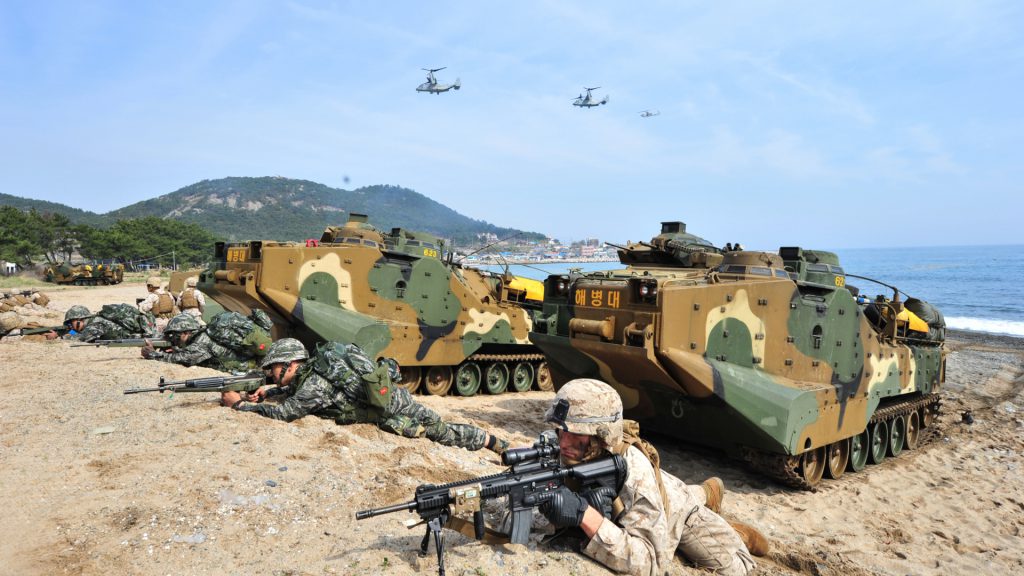
Published March 5, 2019
President Trump was right to walk away from a deal with the North Koreans last week. But he was wrong to walk away from annual military exercises with our South Korean allies. That move raises fears that walking away from our decades-long alliance could be next — something that would be disastrous for the United States.
The United States and South Korea have been allies since the start of the Korean War in 1950. With United Nations backing, U.S. troops rescued the South from a devastating invasion by the North. While the war ended in 1953, no final peace treaty has ever been signed. Our troops have stayed behind ever since, guaranteeing that a second invasion from North Korea would meet with a swift and massive U.S. response.
The training exercises are crucial to the alliance’s viability. They allow U.S. and South Korean forces to practice repelling an invasion by North Korea, ensuring that troops and commanders can work closely together in the event of an actual attack. They also signal continued U.S. commitment to the alliance itself.
Trump says he decided to suspend this year’s two land exercises, Key Resolve and Foal Eagle, to save money and to help improve relations with Pyongyang. Neither explanation justifies his decision.
The cost to hold the exercises, estimated at $14 million, is trivial in the context of a $700 billion U.S. defense budget. Moreover, the South Korean government just agreed to increase the amount it pays each year for basing U.S. troops in the country by more than $50 million. Insisting our allies pay more to get less is a terrible idea.
Trump also apparently acceded to a key North Korean demand without getting anything in return. North Korean leader Kim Jong Un had specifically protested the annual exercises in his New Year’s Day speech, reiterating a longtime demand. But Trump said he never discussed canceling the maneuvers with Kim at the recently concluded Hanoi summit. Giving away a valuable bargaining chip for nothing is usually not a good move.
South Korea has long been one of our nation’s most dependable allies. It sent tens of thousands of troops to fight with the United States during the Vietnam War, suffering 5,000 combat deaths and an additional 10,000 casualties. Unlike some NATO allies, South Korea spends heavily on its own defense. It spent more than 2.5 percent of its gross domestic product on defense in 2017, and its recent defense budget anticipates continued 7.5 percent annual increases over the next five years. South Korea is a great example of what Trump says he wants our European allies to become.
Trump often talks disparagingly about the U.S.-led global alliance network. Time and again, he mentions purportedly high costs, as if the United States gets nothing in return from the network. In fact, our allies provide invaluable intelligence and military assets to protect the United States. With their help, our Russian, Chinese and Iranian adversaries are kept in check and far away from the homeland. We would be much less secure without their aid.
That’s not to say Trump’s challenge to the national security consensus doesn’t have its points. The United States and its allies cut their defense budgets dramatically in the wake of the Soviet Union’s collapse in 1991. As Russia has rearmed and China has grown into a potential world power, alliance countries need to rebuild their militaries in response. Trump has rightly called out some allies’ reluctance to do so.
But none of that should apply to South Korea. They face hundreds of thousands of hostile troops across their border every day. The South Korean capital, Seoul, is within artillery range of North Korea. Millions of South Koreans could be shelled within minutes if a war breaks out. While South Korea’s government favors improved relations with Pyongyang, it also understands the value of a strong military. The Trump administration should be helping a strong ally, not undermining it.
U.S. allies worldwide will be looking to see what happens next. China and North Korea have long sought removal of American troops from the Korean Peninsula. Trump wants deals on trade with China and denuclearization with North Korea, and many allies wonder whether he will cast aside South Korea in pursuit of these pacts. They worry that the cancellation of these exercises is just the first step toward withdrawing U.S. troops and perhaps even canceling the alliance itself. More than 1 million foreign-born Korean Americans will look at this as well, assessing whether their new homeland still cares enough to protect their old one.
Trump has made a mistake. He should not compound that error by allowing North Korea or the Chinese to think they can bargain away our alliance in exchange for vain promises or a smaller trade deficit.
Henry Olsen is a Washington Post columnist and a senior fellow at the Ethics and Public Policy Center.





